An In-Depth Report on Ethics and Leadership in Education
VerifiedAdded on 2022/10/17
|11
|2538
|17
Report
AI Summary
This report delves into the critical role of ethics in educational leadership, emphasizing its influence on teachers, students, and the broader community. It highlights how ethical frameworks and codes of conduct guide educational leaders in making sound decisions that positively impact society. The report analyzes a case study involving a student's grade dispute, illustrating the ethical dilemmas leaders face and the importance of ethical decision-making processes. It concludes that ethical leadership is essential for fostering a positive educational environment and promoting responsible behavior among all stakeholders. Desklib provides access to similar solved assignments and study resources for students.
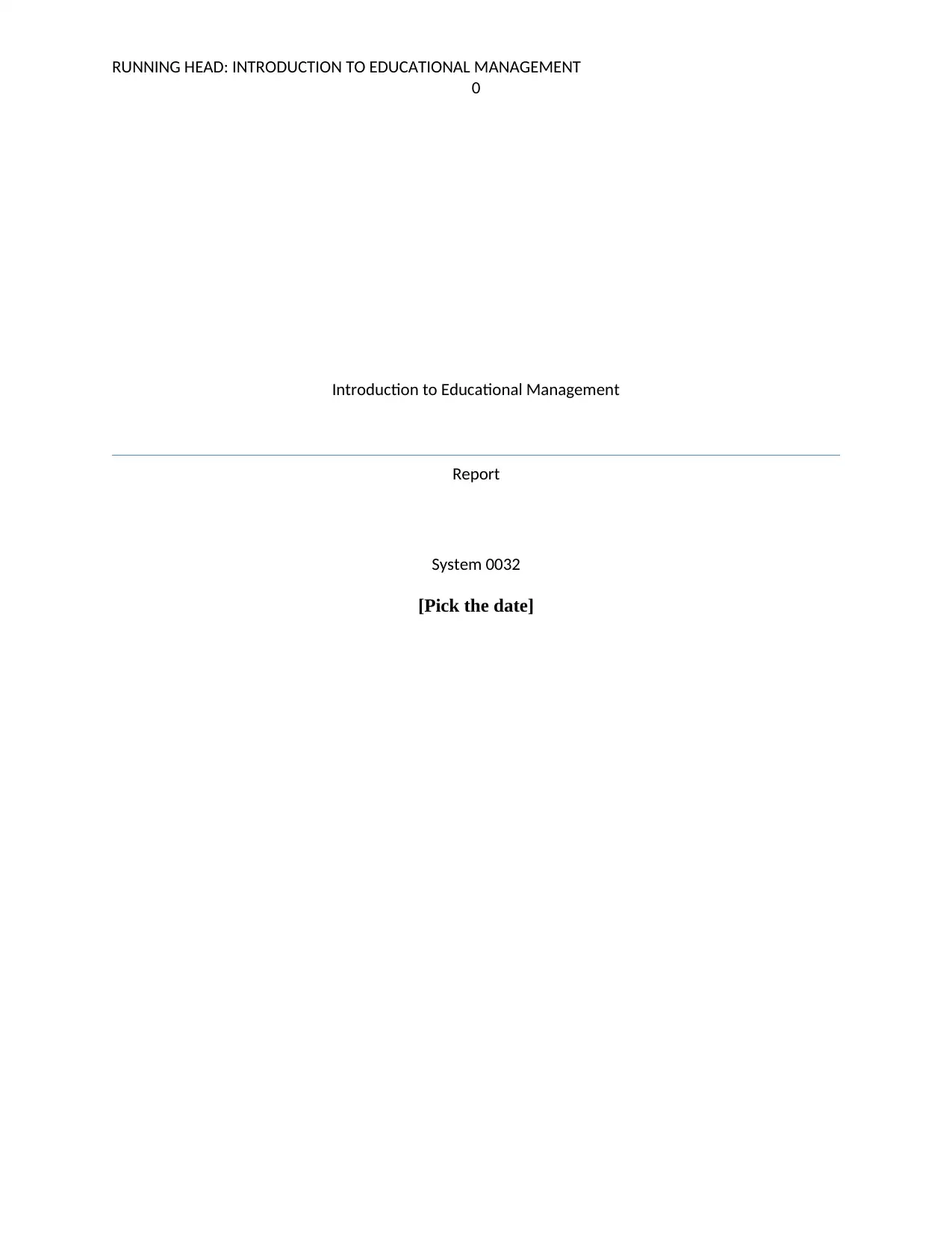
RUNNING HEAD: INTRODUCTION TO EDUCATIONAL MANAGEMENT
0
Introduction to Educational Management
Report
System 0032
[Pick the date]
0
Introduction to Educational Management
Report
System 0032
[Pick the date]
Paraphrase This Document
Need a fresh take? Get an instant paraphrase of this document with our AI Paraphraser
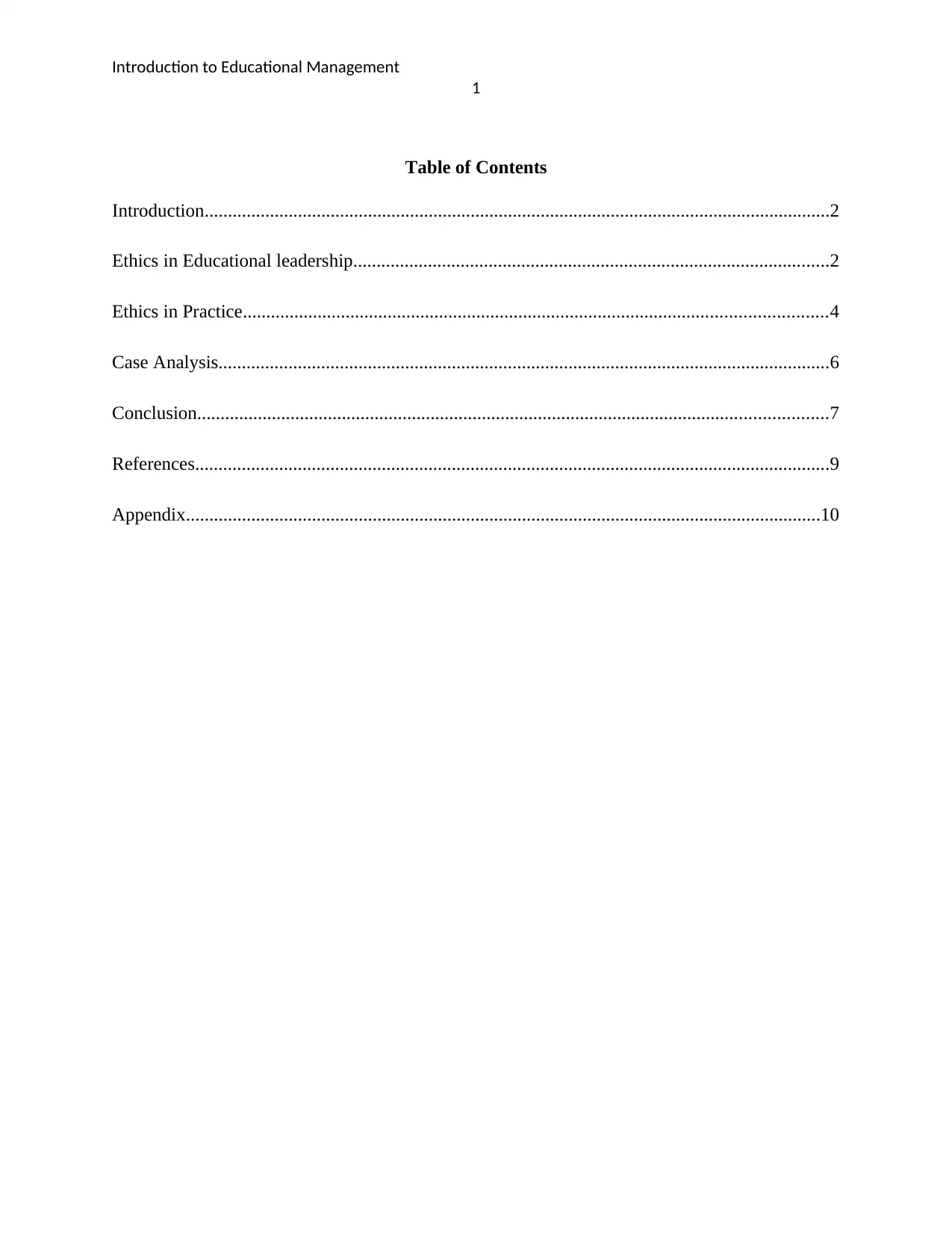
Introduction to Educational Management
1
Table of Contents
Introduction......................................................................................................................................2
Ethics in Educational leadership......................................................................................................2
Ethics in Practice.............................................................................................................................4
Case Analysis...................................................................................................................................6
Conclusion.......................................................................................................................................7
References........................................................................................................................................9
Appendix........................................................................................................................................10
1
Table of Contents
Introduction......................................................................................................................................2
Ethics in Educational leadership......................................................................................................2
Ethics in Practice.............................................................................................................................4
Case Analysis...................................................................................................................................6
Conclusion.......................................................................................................................................7
References........................................................................................................................................9
Appendix........................................................................................................................................10
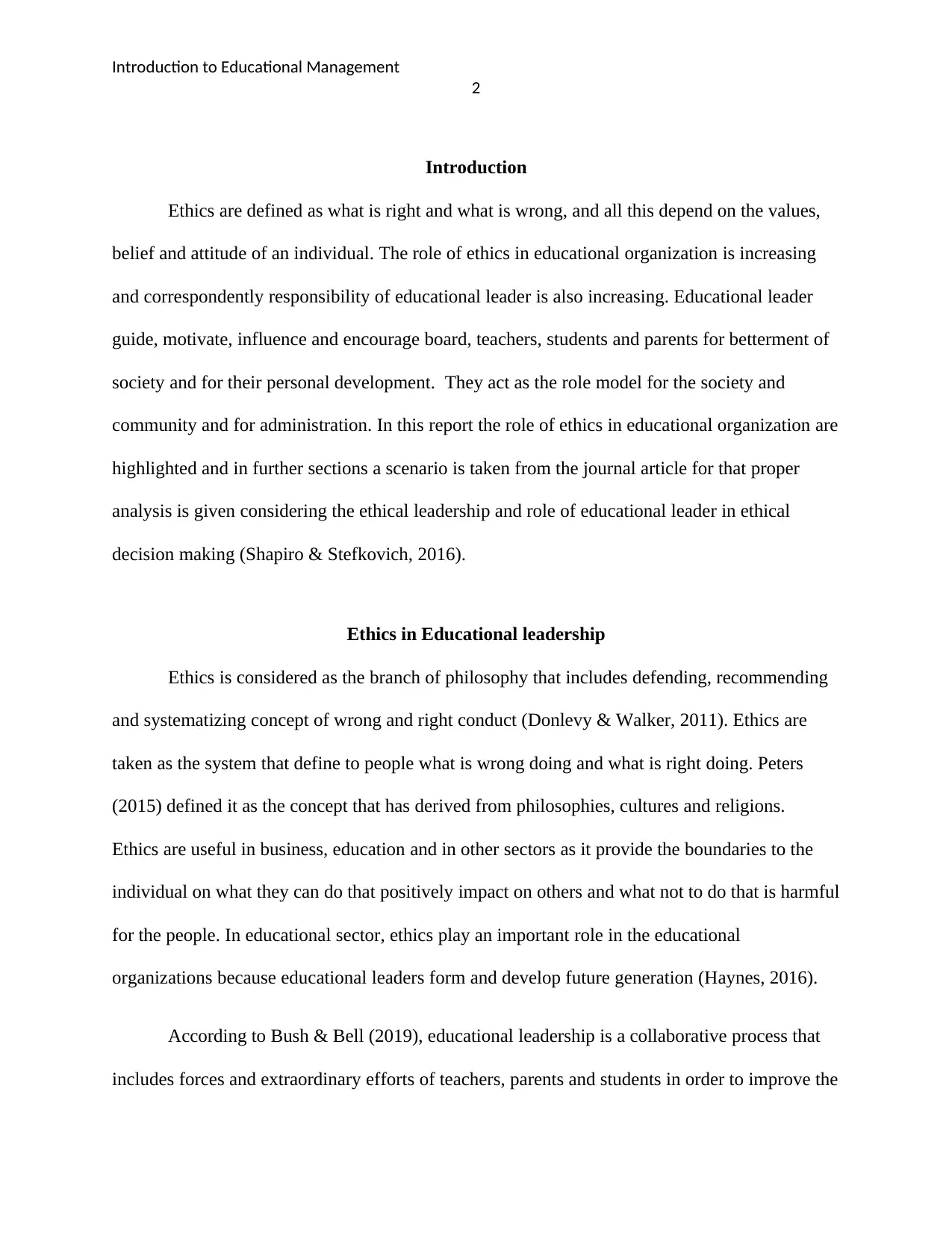
Introduction to Educational Management
2
Introduction
Ethics are defined as what is right and what is wrong, and all this depend on the values,
belief and attitude of an individual. The role of ethics in educational organization is increasing
and correspondently responsibility of educational leader is also increasing. Educational leader
guide, motivate, influence and encourage board, teachers, students and parents for betterment of
society and for their personal development. They act as the role model for the society and
community and for administration. In this report the role of ethics in educational organization are
highlighted and in further sections a scenario is taken from the journal article for that proper
analysis is given considering the ethical leadership and role of educational leader in ethical
decision making (Shapiro & Stefkovich, 2016).
Ethics in Educational leadership
Ethics is considered as the branch of philosophy that includes defending, recommending
and systematizing concept of wrong and right conduct (Donlevy & Walker, 2011). Ethics are
taken as the system that define to people what is wrong doing and what is right doing. Peters
(2015) defined it as the concept that has derived from philosophies, cultures and religions.
Ethics are useful in business, education and in other sectors as it provide the boundaries to the
individual on what they can do that positively impact on others and what not to do that is harmful
for the people. In educational sector, ethics play an important role in the educational
organizations because educational leaders form and develop future generation (Haynes, 2016).
According to Bush & Bell (2019), educational leadership is a collaborative process that
includes forces and extraordinary efforts of teachers, parents and students in order to improve the
2
Introduction
Ethics are defined as what is right and what is wrong, and all this depend on the values,
belief and attitude of an individual. The role of ethics in educational organization is increasing
and correspondently responsibility of educational leader is also increasing. Educational leader
guide, motivate, influence and encourage board, teachers, students and parents for betterment of
society and for their personal development. They act as the role model for the society and
community and for administration. In this report the role of ethics in educational organization are
highlighted and in further sections a scenario is taken from the journal article for that proper
analysis is given considering the ethical leadership and role of educational leader in ethical
decision making (Shapiro & Stefkovich, 2016).
Ethics in Educational leadership
Ethics is considered as the branch of philosophy that includes defending, recommending
and systematizing concept of wrong and right conduct (Donlevy & Walker, 2011). Ethics are
taken as the system that define to people what is wrong doing and what is right doing. Peters
(2015) defined it as the concept that has derived from philosophies, cultures and religions.
Ethics are useful in business, education and in other sectors as it provide the boundaries to the
individual on what they can do that positively impact on others and what not to do that is harmful
for the people. In educational sector, ethics play an important role in the educational
organizations because educational leaders form and develop future generation (Haynes, 2016).
According to Bush & Bell (2019), educational leadership is a collaborative process that
includes forces and extraordinary efforts of teachers, parents and students in order to improve the
⊘ This is a preview!⊘
Do you want full access?
Subscribe today to unlock all pages.

Trusted by 1+ million students worldwide
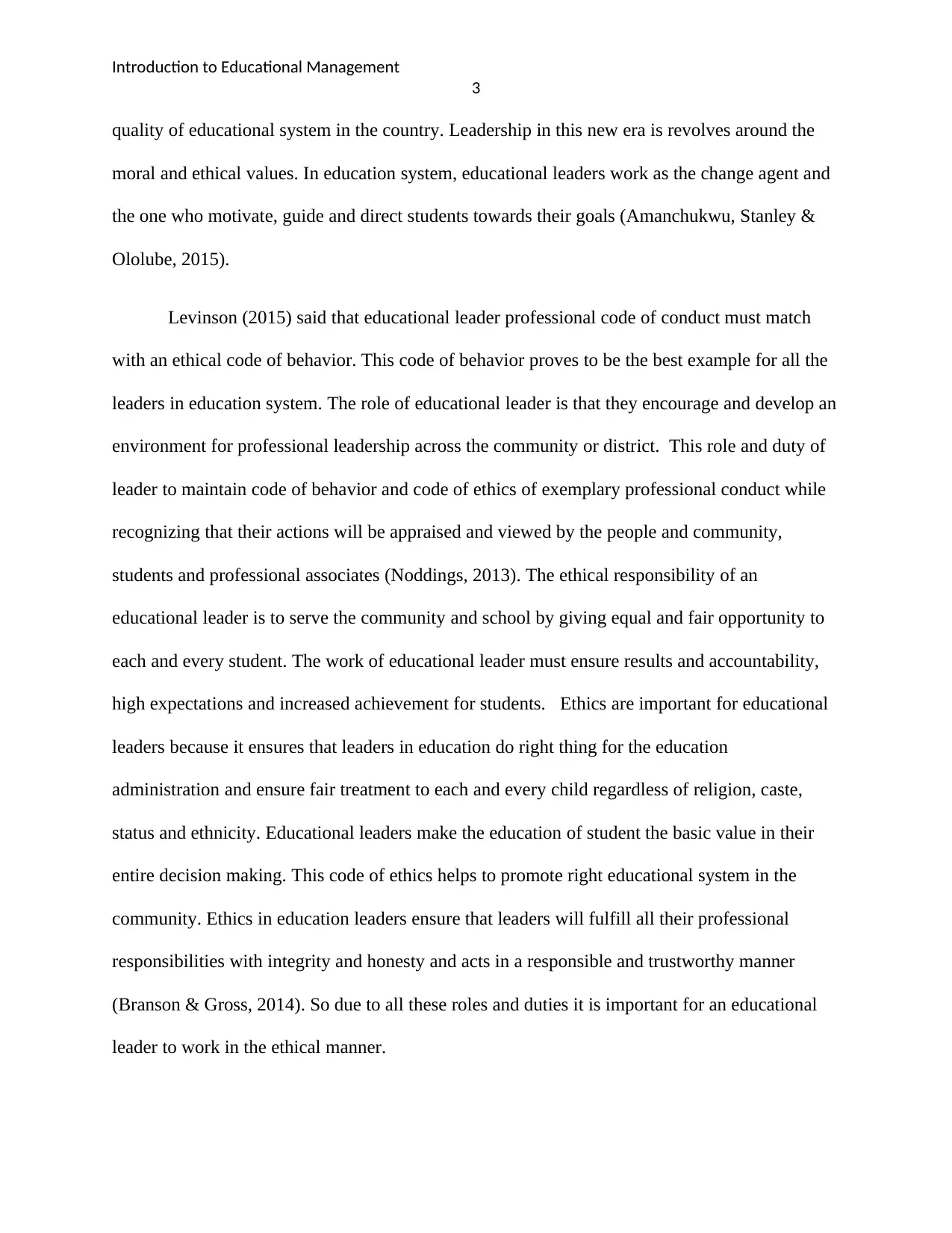
Introduction to Educational Management
3
quality of educational system in the country. Leadership in this new era is revolves around the
moral and ethical values. In education system, educational leaders work as the change agent and
the one who motivate, guide and direct students towards their goals (Amanchukwu, Stanley &
Ololube, 2015).
Levinson (2015) said that educational leader professional code of conduct must match
with an ethical code of behavior. This code of behavior proves to be the best example for all the
leaders in education system. The role of educational leader is that they encourage and develop an
environment for professional leadership across the community or district. This role and duty of
leader to maintain code of behavior and code of ethics of exemplary professional conduct while
recognizing that their actions will be appraised and viewed by the people and community,
students and professional associates (Noddings, 2013). The ethical responsibility of an
educational leader is to serve the community and school by giving equal and fair opportunity to
each and every student. The work of educational leader must ensure results and accountability,
high expectations and increased achievement for students. Ethics are important for educational
leaders because it ensures that leaders in education do right thing for the education
administration and ensure fair treatment to each and every child regardless of religion, caste,
status and ethnicity. Educational leaders make the education of student the basic value in their
entire decision making. This code of ethics helps to promote right educational system in the
community. Ethics in education leaders ensure that leaders will fulfill all their professional
responsibilities with integrity and honesty and acts in a responsible and trustworthy manner
(Branson & Gross, 2014). So due to all these roles and duties it is important for an educational
leader to work in the ethical manner.
3
quality of educational system in the country. Leadership in this new era is revolves around the
moral and ethical values. In education system, educational leaders work as the change agent and
the one who motivate, guide and direct students towards their goals (Amanchukwu, Stanley &
Ololube, 2015).
Levinson (2015) said that educational leader professional code of conduct must match
with an ethical code of behavior. This code of behavior proves to be the best example for all the
leaders in education system. The role of educational leader is that they encourage and develop an
environment for professional leadership across the community or district. This role and duty of
leader to maintain code of behavior and code of ethics of exemplary professional conduct while
recognizing that their actions will be appraised and viewed by the people and community,
students and professional associates (Noddings, 2013). The ethical responsibility of an
educational leader is to serve the community and school by giving equal and fair opportunity to
each and every student. The work of educational leader must ensure results and accountability,
high expectations and increased achievement for students. Ethics are important for educational
leaders because it ensures that leaders in education do right thing for the education
administration and ensure fair treatment to each and every child regardless of religion, caste,
status and ethnicity. Educational leaders make the education of student the basic value in their
entire decision making. This code of ethics helps to promote right educational system in the
community. Ethics in education leaders ensure that leaders will fulfill all their professional
responsibilities with integrity and honesty and acts in a responsible and trustworthy manner
(Branson & Gross, 2014). So due to all these roles and duties it is important for an educational
leader to work in the ethical manner.
Paraphrase This Document
Need a fresh take? Get an instant paraphrase of this document with our AI Paraphraser
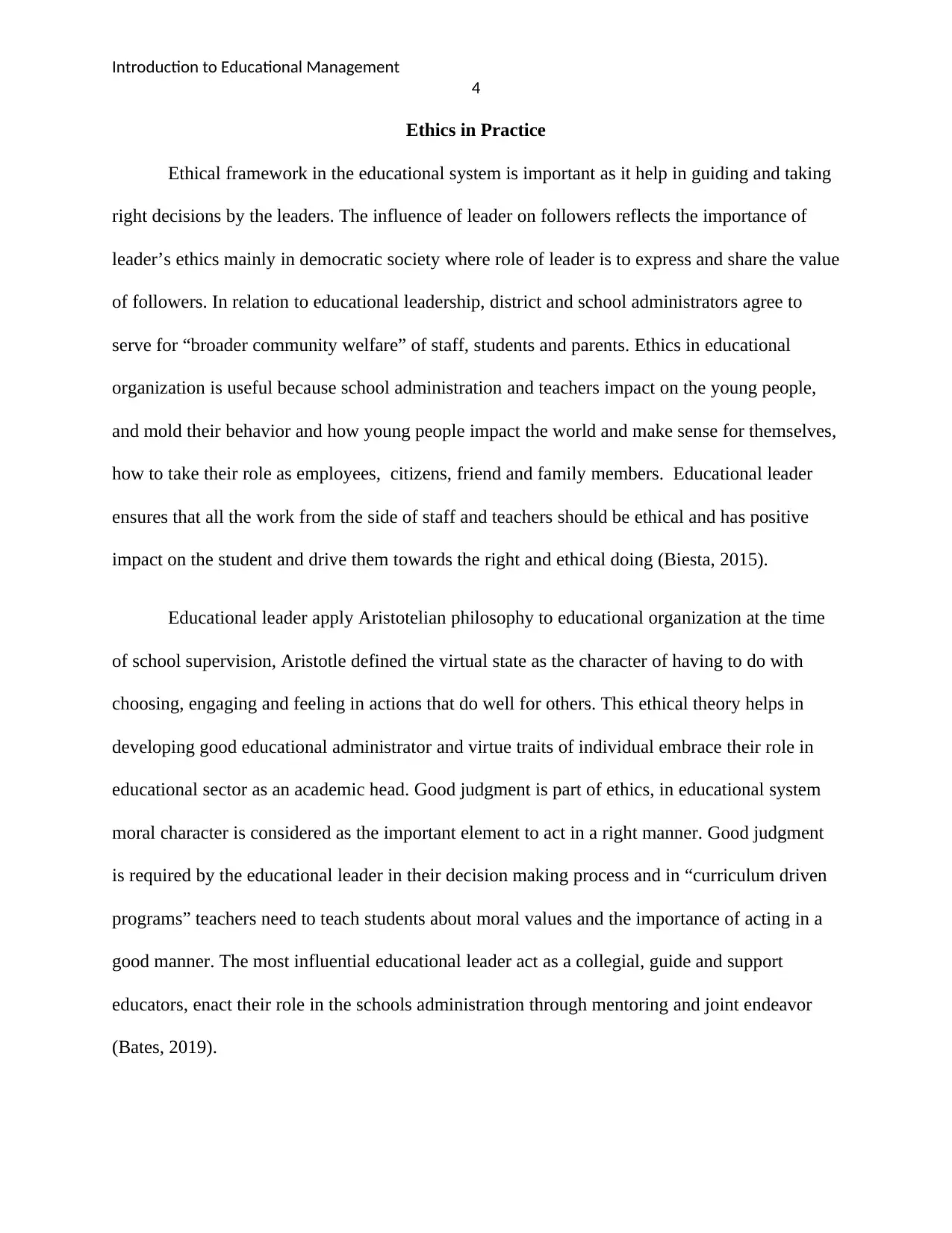
Introduction to Educational Management
4
Ethics in Practice
Ethical framework in the educational system is important as it help in guiding and taking
right decisions by the leaders. The influence of leader on followers reflects the importance of
leader’s ethics mainly in democratic society where role of leader is to express and share the value
of followers. In relation to educational leadership, district and school administrators agree to
serve for “broader community welfare” of staff, students and parents. Ethics in educational
organization is useful because school administration and teachers impact on the young people,
and mold their behavior and how young people impact the world and make sense for themselves,
how to take their role as employees, citizens, friend and family members. Educational leader
ensures that all the work from the side of staff and teachers should be ethical and has positive
impact on the student and drive them towards the right and ethical doing (Biesta, 2015).
Educational leader apply Aristotelian philosophy to educational organization at the time
of school supervision, Aristotle defined the virtual state as the character of having to do with
choosing, engaging and feeling in actions that do well for others. This ethical theory helps in
developing good educational administrator and virtue traits of individual embrace their role in
educational sector as an academic head. Good judgment is part of ethics, in educational system
moral character is considered as the important element to act in a right manner. Good judgment
is required by the educational leader in their decision making process and in “curriculum driven
programs” teachers need to teach students about moral values and the importance of acting in a
good manner. The most influential educational leader act as a collegial, guide and support
educators, enact their role in the schools administration through mentoring and joint endeavor
(Bates, 2019).
4
Ethics in Practice
Ethical framework in the educational system is important as it help in guiding and taking
right decisions by the leaders. The influence of leader on followers reflects the importance of
leader’s ethics mainly in democratic society where role of leader is to express and share the value
of followers. In relation to educational leadership, district and school administrators agree to
serve for “broader community welfare” of staff, students and parents. Ethics in educational
organization is useful because school administration and teachers impact on the young people,
and mold their behavior and how young people impact the world and make sense for themselves,
how to take their role as employees, citizens, friend and family members. Educational leader
ensures that all the work from the side of staff and teachers should be ethical and has positive
impact on the student and drive them towards the right and ethical doing (Biesta, 2015).
Educational leader apply Aristotelian philosophy to educational organization at the time
of school supervision, Aristotle defined the virtual state as the character of having to do with
choosing, engaging and feeling in actions that do well for others. This ethical theory helps in
developing good educational administrator and virtue traits of individual embrace their role in
educational sector as an academic head. Good judgment is part of ethics, in educational system
moral character is considered as the important element to act in a right manner. Good judgment
is required by the educational leader in their decision making process and in “curriculum driven
programs” teachers need to teach students about moral values and the importance of acting in a
good manner. The most influential educational leader act as a collegial, guide and support
educators, enact their role in the schools administration through mentoring and joint endeavor
(Bates, 2019).
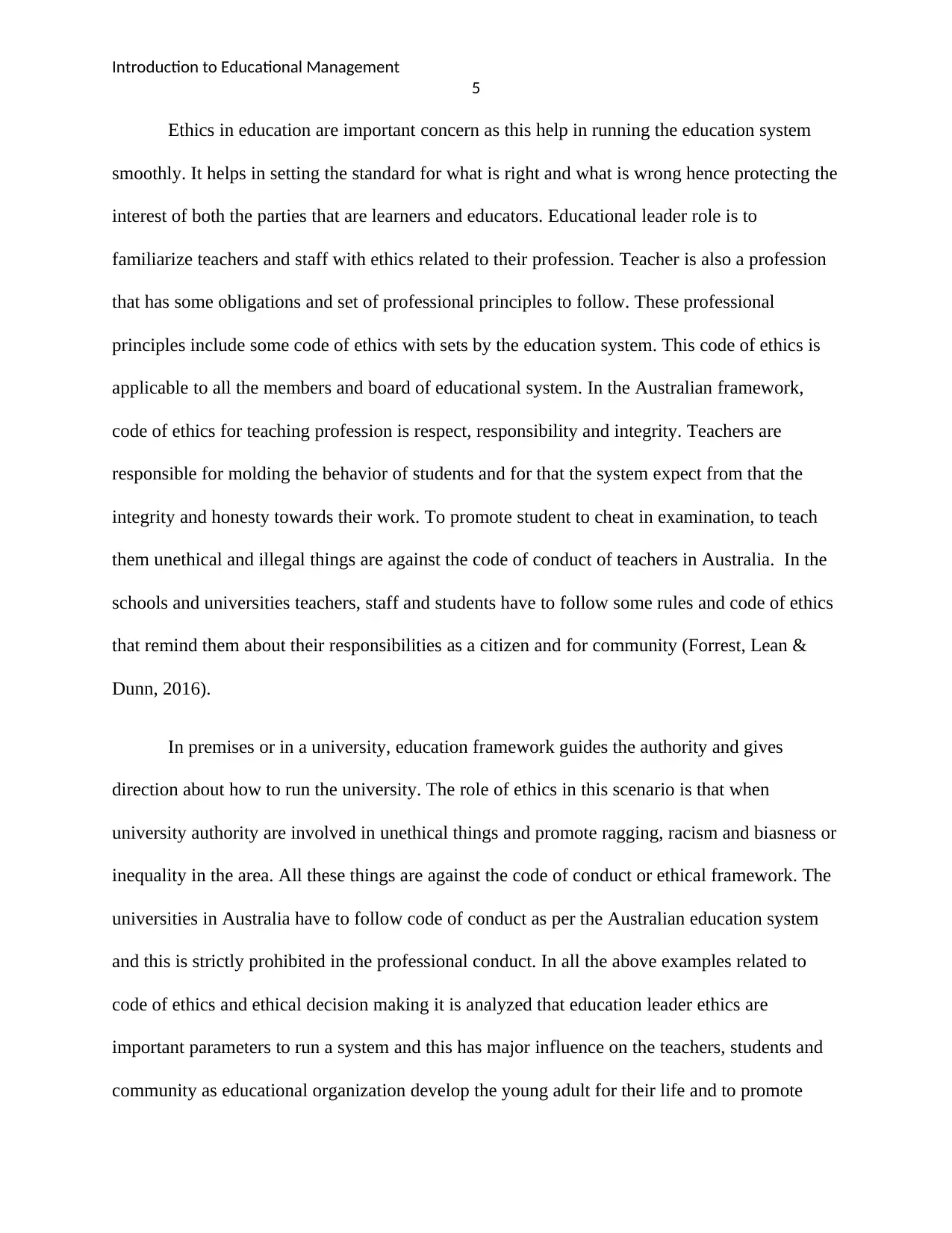
Introduction to Educational Management
5
Ethics in education are important concern as this help in running the education system
smoothly. It helps in setting the standard for what is right and what is wrong hence protecting the
interest of both the parties that are learners and educators. Educational leader role is to
familiarize teachers and staff with ethics related to their profession. Teacher is also a profession
that has some obligations and set of professional principles to follow. These professional
principles include some code of ethics with sets by the education system. This code of ethics is
applicable to all the members and board of educational system. In the Australian framework,
code of ethics for teaching profession is respect, responsibility and integrity. Teachers are
responsible for molding the behavior of students and for that the system expect from that the
integrity and honesty towards their work. To promote student to cheat in examination, to teach
them unethical and illegal things are against the code of conduct of teachers in Australia. In the
schools and universities teachers, staff and students have to follow some rules and code of ethics
that remind them about their responsibilities as a citizen and for community (Forrest, Lean &
Dunn, 2016).
In premises or in a university, education framework guides the authority and gives
direction about how to run the university. The role of ethics in this scenario is that when
university authority are involved in unethical things and promote ragging, racism and biasness or
inequality in the area. All these things are against the code of conduct or ethical framework. The
universities in Australia have to follow code of conduct as per the Australian education system
and this is strictly prohibited in the professional conduct. In all the above examples related to
code of ethics and ethical decision making it is analyzed that education leader ethics are
important parameters to run a system and this has major influence on the teachers, students and
community as educational organization develop the young adult for their life and to promote
5
Ethics in education are important concern as this help in running the education system
smoothly. It helps in setting the standard for what is right and what is wrong hence protecting the
interest of both the parties that are learners and educators. Educational leader role is to
familiarize teachers and staff with ethics related to their profession. Teacher is also a profession
that has some obligations and set of professional principles to follow. These professional
principles include some code of ethics with sets by the education system. This code of ethics is
applicable to all the members and board of educational system. In the Australian framework,
code of ethics for teaching profession is respect, responsibility and integrity. Teachers are
responsible for molding the behavior of students and for that the system expect from that the
integrity and honesty towards their work. To promote student to cheat in examination, to teach
them unethical and illegal things are against the code of conduct of teachers in Australia. In the
schools and universities teachers, staff and students have to follow some rules and code of ethics
that remind them about their responsibilities as a citizen and for community (Forrest, Lean &
Dunn, 2016).
In premises or in a university, education framework guides the authority and gives
direction about how to run the university. The role of ethics in this scenario is that when
university authority are involved in unethical things and promote ragging, racism and biasness or
inequality in the area. All these things are against the code of conduct or ethical framework. The
universities in Australia have to follow code of conduct as per the Australian education system
and this is strictly prohibited in the professional conduct. In all the above examples related to
code of ethics and ethical decision making it is analyzed that education leader ethics are
important parameters to run a system and this has major influence on the teachers, students and
community as educational organization develop the young adult for their life and to promote
⊘ This is a preview!⊘
Do you want full access?
Subscribe today to unlock all pages.

Trusted by 1+ million students worldwide
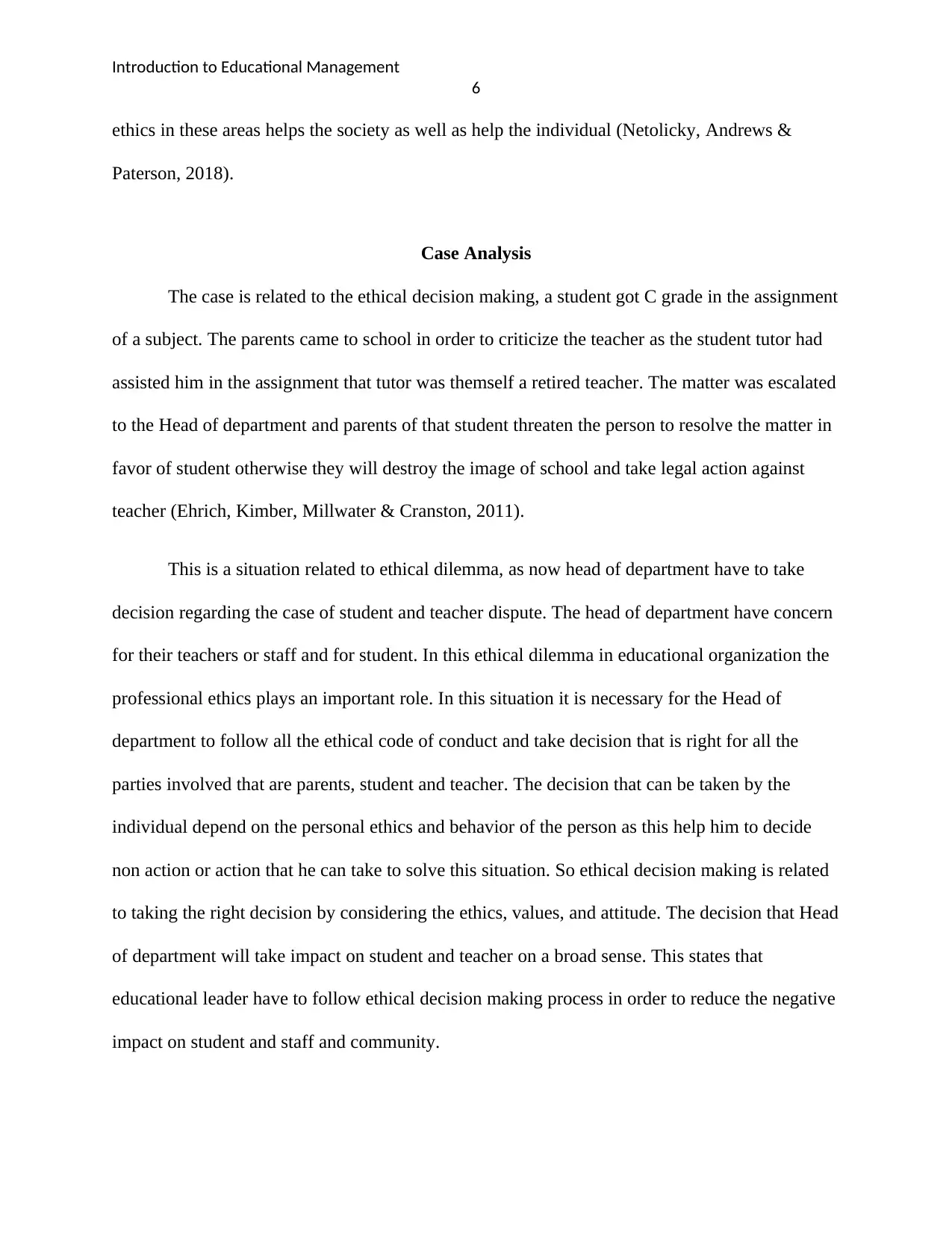
Introduction to Educational Management
6
ethics in these areas helps the society as well as help the individual (Netolicky, Andrews &
Paterson, 2018).
Case Analysis
The case is related to the ethical decision making, a student got C grade in the assignment
of a subject. The parents came to school in order to criticize the teacher as the student tutor had
assisted him in the assignment that tutor was themself a retired teacher. The matter was escalated
to the Head of department and parents of that student threaten the person to resolve the matter in
favor of student otherwise they will destroy the image of school and take legal action against
teacher (Ehrich, Kimber, Millwater & Cranston, 2011).
This is a situation related to ethical dilemma, as now head of department have to take
decision regarding the case of student and teacher dispute. The head of department have concern
for their teachers or staff and for student. In this ethical dilemma in educational organization the
professional ethics plays an important role. In this situation it is necessary for the Head of
department to follow all the ethical code of conduct and take decision that is right for all the
parties involved that are parents, student and teacher. The decision that can be taken by the
individual depend on the personal ethics and behavior of the person as this help him to decide
non action or action that he can take to solve this situation. So ethical decision making is related
to taking the right decision by considering the ethics, values, and attitude. The decision that Head
of department will take impact on student and teacher on a broad sense. This states that
educational leader have to follow ethical decision making process in order to reduce the negative
impact on student and staff and community.
6
ethics in these areas helps the society as well as help the individual (Netolicky, Andrews &
Paterson, 2018).
Case Analysis
The case is related to the ethical decision making, a student got C grade in the assignment
of a subject. The parents came to school in order to criticize the teacher as the student tutor had
assisted him in the assignment that tutor was themself a retired teacher. The matter was escalated
to the Head of department and parents of that student threaten the person to resolve the matter in
favor of student otherwise they will destroy the image of school and take legal action against
teacher (Ehrich, Kimber, Millwater & Cranston, 2011).
This is a situation related to ethical dilemma, as now head of department have to take
decision regarding the case of student and teacher dispute. The head of department have concern
for their teachers or staff and for student. In this ethical dilemma in educational organization the
professional ethics plays an important role. In this situation it is necessary for the Head of
department to follow all the ethical code of conduct and take decision that is right for all the
parties involved that are parents, student and teacher. The decision that can be taken by the
individual depend on the personal ethics and behavior of the person as this help him to decide
non action or action that he can take to solve this situation. So ethical decision making is related
to taking the right decision by considering the ethics, values, and attitude. The decision that Head
of department will take impact on student and teacher on a broad sense. This states that
educational leader have to follow ethical decision making process in order to reduce the negative
impact on student and staff and community.
Paraphrase This Document
Need a fresh take? Get an instant paraphrase of this document with our AI Paraphraser
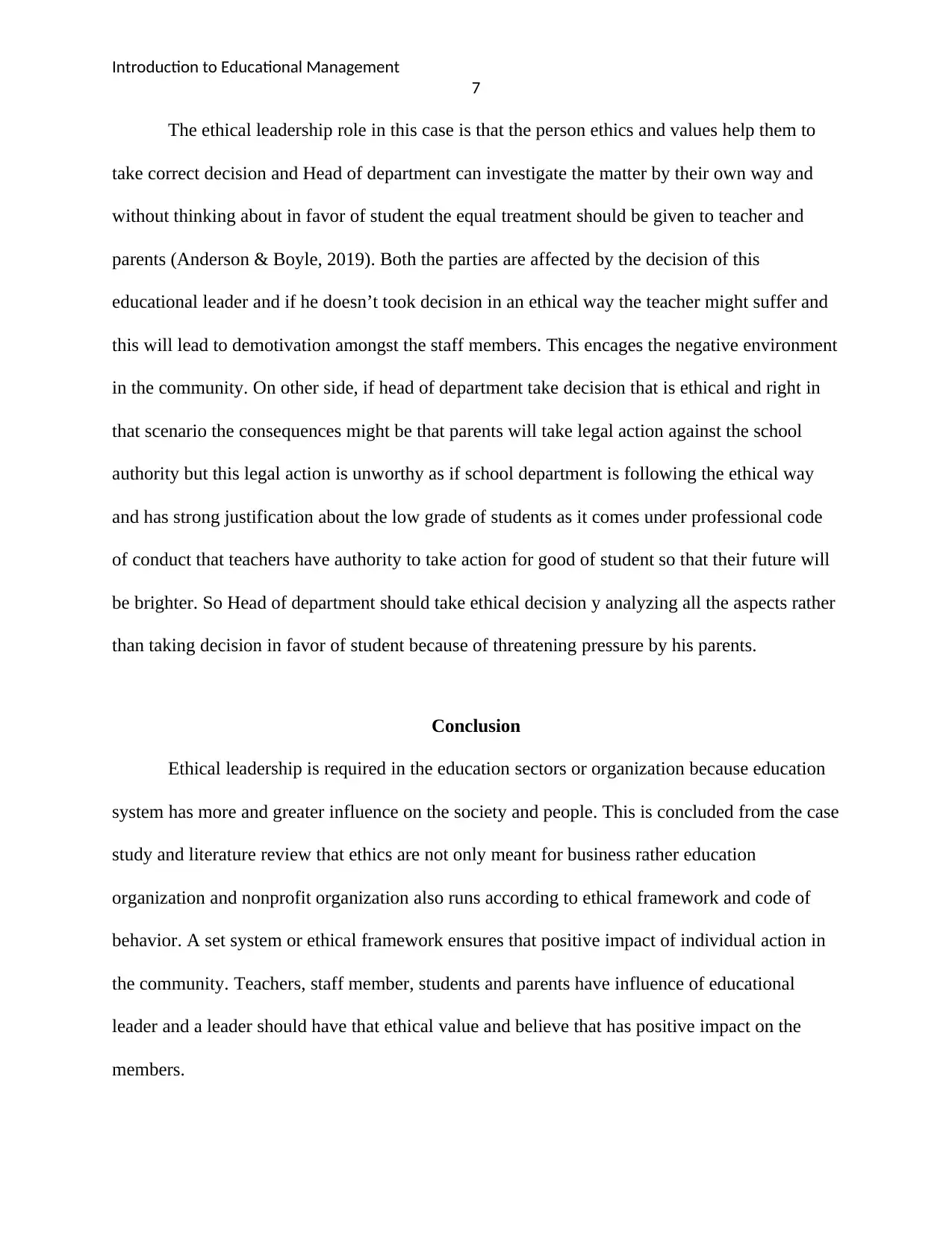
Introduction to Educational Management
7
The ethical leadership role in this case is that the person ethics and values help them to
take correct decision and Head of department can investigate the matter by their own way and
without thinking about in favor of student the equal treatment should be given to teacher and
parents (Anderson & Boyle, 2019). Both the parties are affected by the decision of this
educational leader and if he doesn’t took decision in an ethical way the teacher might suffer and
this will lead to demotivation amongst the staff members. This encages the negative environment
in the community. On other side, if head of department take decision that is ethical and right in
that scenario the consequences might be that parents will take legal action against the school
authority but this legal action is unworthy as if school department is following the ethical way
and has strong justification about the low grade of students as it comes under professional code
of conduct that teachers have authority to take action for good of student so that their future will
be brighter. So Head of department should take ethical decision y analyzing all the aspects rather
than taking decision in favor of student because of threatening pressure by his parents.
Conclusion
Ethical leadership is required in the education sectors or organization because education
system has more and greater influence on the society and people. This is concluded from the case
study and literature review that ethics are not only meant for business rather education
organization and nonprofit organization also runs according to ethical framework and code of
behavior. A set system or ethical framework ensures that positive impact of individual action in
the community. Teachers, staff member, students and parents have influence of educational
leader and a leader should have that ethical value and believe that has positive impact on the
members.
7
The ethical leadership role in this case is that the person ethics and values help them to
take correct decision and Head of department can investigate the matter by their own way and
without thinking about in favor of student the equal treatment should be given to teacher and
parents (Anderson & Boyle, 2019). Both the parties are affected by the decision of this
educational leader and if he doesn’t took decision in an ethical way the teacher might suffer and
this will lead to demotivation amongst the staff members. This encages the negative environment
in the community. On other side, if head of department take decision that is ethical and right in
that scenario the consequences might be that parents will take legal action against the school
authority but this legal action is unworthy as if school department is following the ethical way
and has strong justification about the low grade of students as it comes under professional code
of conduct that teachers have authority to take action for good of student so that their future will
be brighter. So Head of department should take ethical decision y analyzing all the aspects rather
than taking decision in favor of student because of threatening pressure by his parents.
Conclusion
Ethical leadership is required in the education sectors or organization because education
system has more and greater influence on the society and people. This is concluded from the case
study and literature review that ethics are not only meant for business rather education
organization and nonprofit organization also runs according to ethical framework and code of
behavior. A set system or ethical framework ensures that positive impact of individual action in
the community. Teachers, staff member, students and parents have influence of educational
leader and a leader should have that ethical value and believe that has positive impact on the
members.
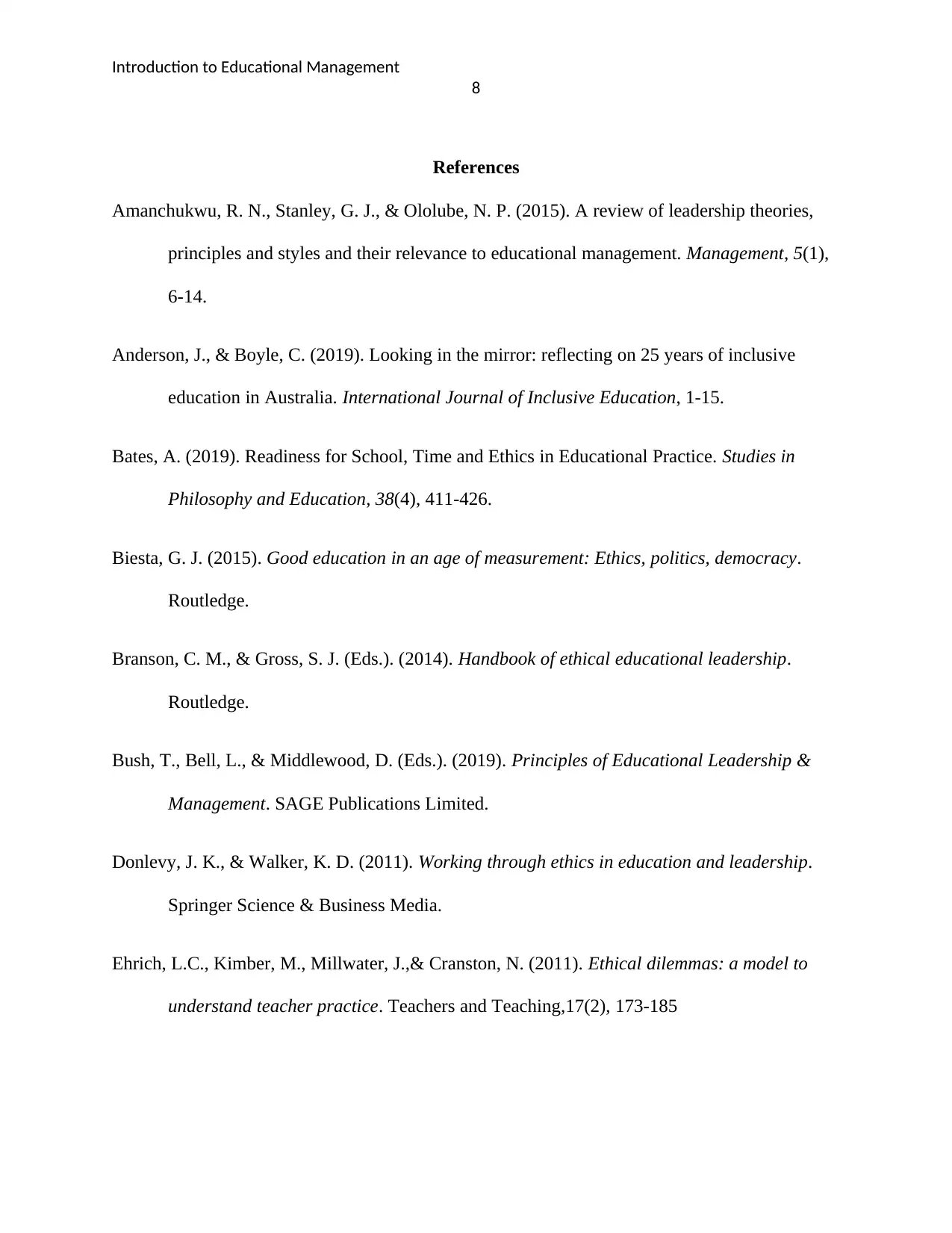
Introduction to Educational Management
8
References
Amanchukwu, R. N., Stanley, G. J., & Ololube, N. P. (2015). A review of leadership theories,
principles and styles and their relevance to educational management. Management, 5(1),
6-14.
Anderson, J., & Boyle, C. (2019). Looking in the mirror: reflecting on 25 years of inclusive
education in Australia. International Journal of Inclusive Education, 1-15.
Bates, A. (2019). Readiness for School, Time and Ethics in Educational Practice. Studies in
Philosophy and Education, 38(4), 411-426.
Biesta, G. J. (2015). Good education in an age of measurement: Ethics, politics, democracy.
Routledge.
Branson, C. M., & Gross, S. J. (Eds.). (2014). Handbook of ethical educational leadership.
Routledge.
Bush, T., Bell, L., & Middlewood, D. (Eds.). (2019). Principles of Educational Leadership &
Management. SAGE Publications Limited.
Donlevy, J. K., & Walker, K. D. (2011). Working through ethics in education and leadership.
Springer Science & Business Media.
Ehrich, L.C., Kimber, M., Millwater, J.,& Cranston, N. (2011). Ethical dilemmas: a model to
understand teacher practice. Teachers and Teaching,17(2), 173-185
8
References
Amanchukwu, R. N., Stanley, G. J., & Ololube, N. P. (2015). A review of leadership theories,
principles and styles and their relevance to educational management. Management, 5(1),
6-14.
Anderson, J., & Boyle, C. (2019). Looking in the mirror: reflecting on 25 years of inclusive
education in Australia. International Journal of Inclusive Education, 1-15.
Bates, A. (2019). Readiness for School, Time and Ethics in Educational Practice. Studies in
Philosophy and Education, 38(4), 411-426.
Biesta, G. J. (2015). Good education in an age of measurement: Ethics, politics, democracy.
Routledge.
Branson, C. M., & Gross, S. J. (Eds.). (2014). Handbook of ethical educational leadership.
Routledge.
Bush, T., Bell, L., & Middlewood, D. (Eds.). (2019). Principles of Educational Leadership &
Management. SAGE Publications Limited.
Donlevy, J. K., & Walker, K. D. (2011). Working through ethics in education and leadership.
Springer Science & Business Media.
Ehrich, L.C., Kimber, M., Millwater, J.,& Cranston, N. (2011). Ethical dilemmas: a model to
understand teacher practice. Teachers and Teaching,17(2), 173-185
⊘ This is a preview!⊘
Do you want full access?
Subscribe today to unlock all pages.

Trusted by 1+ million students worldwide
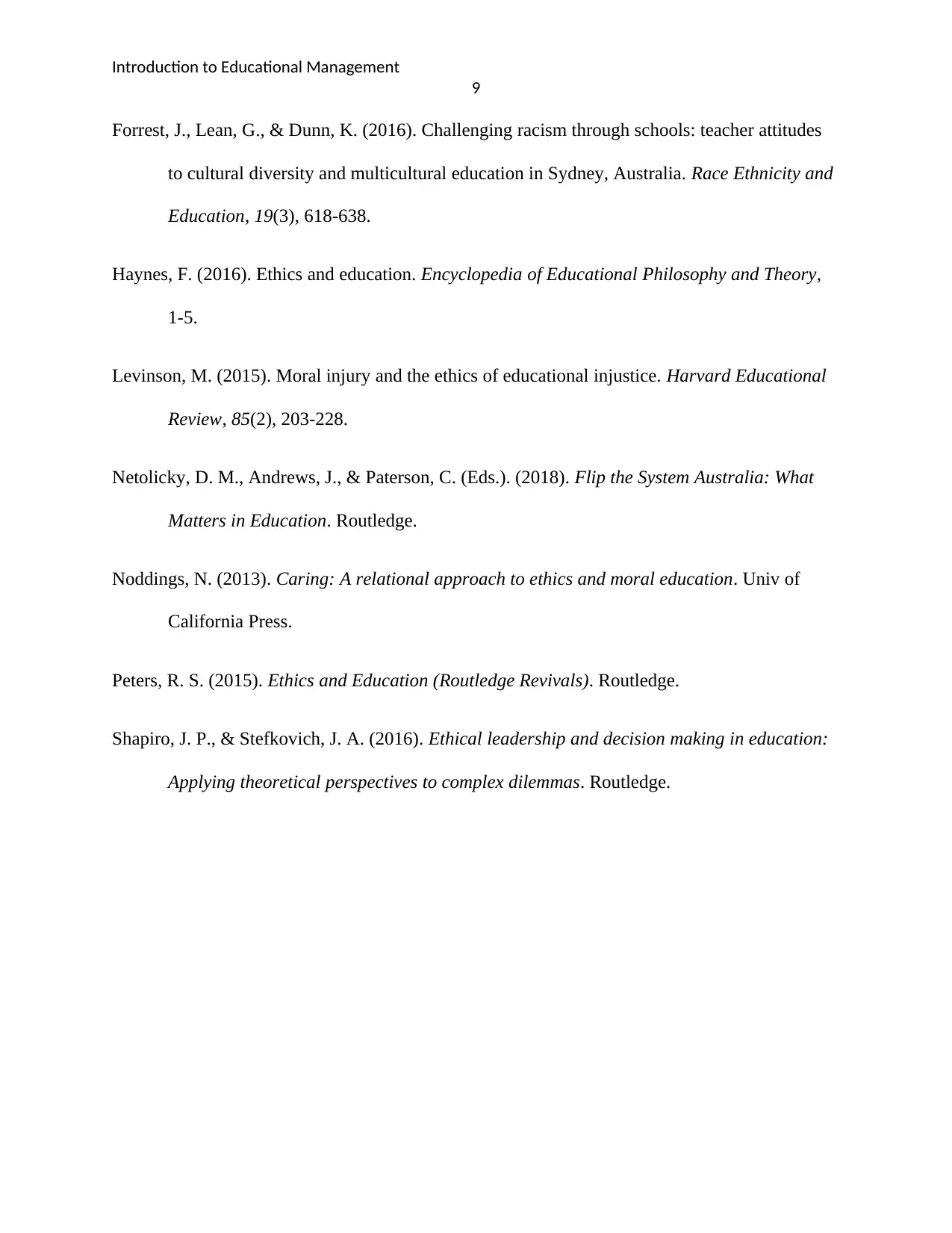
Introduction to Educational Management
9
Forrest, J., Lean, G., & Dunn, K. (2016). Challenging racism through schools: teacher attitudes
to cultural diversity and multicultural education in Sydney, Australia. Race Ethnicity and
Education, 19(3), 618-638.
Haynes, F. (2016). Ethics and education. Encyclopedia of Educational Philosophy and Theory,
1-5.
Levinson, M. (2015). Moral injury and the ethics of educational injustice. Harvard Educational
Review, 85(2), 203-228.
Netolicky, D. M., Andrews, J., & Paterson, C. (Eds.). (2018). Flip the System Australia: What
Matters in Education. Routledge.
Noddings, N. (2013). Caring: A relational approach to ethics and moral education. Univ of
California Press.
Peters, R. S. (2015). Ethics and Education (Routledge Revivals). Routledge.
Shapiro, J. P., & Stefkovich, J. A. (2016). Ethical leadership and decision making in education:
Applying theoretical perspectives to complex dilemmas. Routledge.
9
Forrest, J., Lean, G., & Dunn, K. (2016). Challenging racism through schools: teacher attitudes
to cultural diversity and multicultural education in Sydney, Australia. Race Ethnicity and
Education, 19(3), 618-638.
Haynes, F. (2016). Ethics and education. Encyclopedia of Educational Philosophy and Theory,
1-5.
Levinson, M. (2015). Moral injury and the ethics of educational injustice. Harvard Educational
Review, 85(2), 203-228.
Netolicky, D. M., Andrews, J., & Paterson, C. (Eds.). (2018). Flip the System Australia: What
Matters in Education. Routledge.
Noddings, N. (2013). Caring: A relational approach to ethics and moral education. Univ of
California Press.
Peters, R. S. (2015). Ethics and Education (Routledge Revivals). Routledge.
Shapiro, J. P., & Stefkovich, J. A. (2016). Ethical leadership and decision making in education:
Applying theoretical perspectives to complex dilemmas. Routledge.
Paraphrase This Document
Need a fresh take? Get an instant paraphrase of this document with our AI Paraphraser
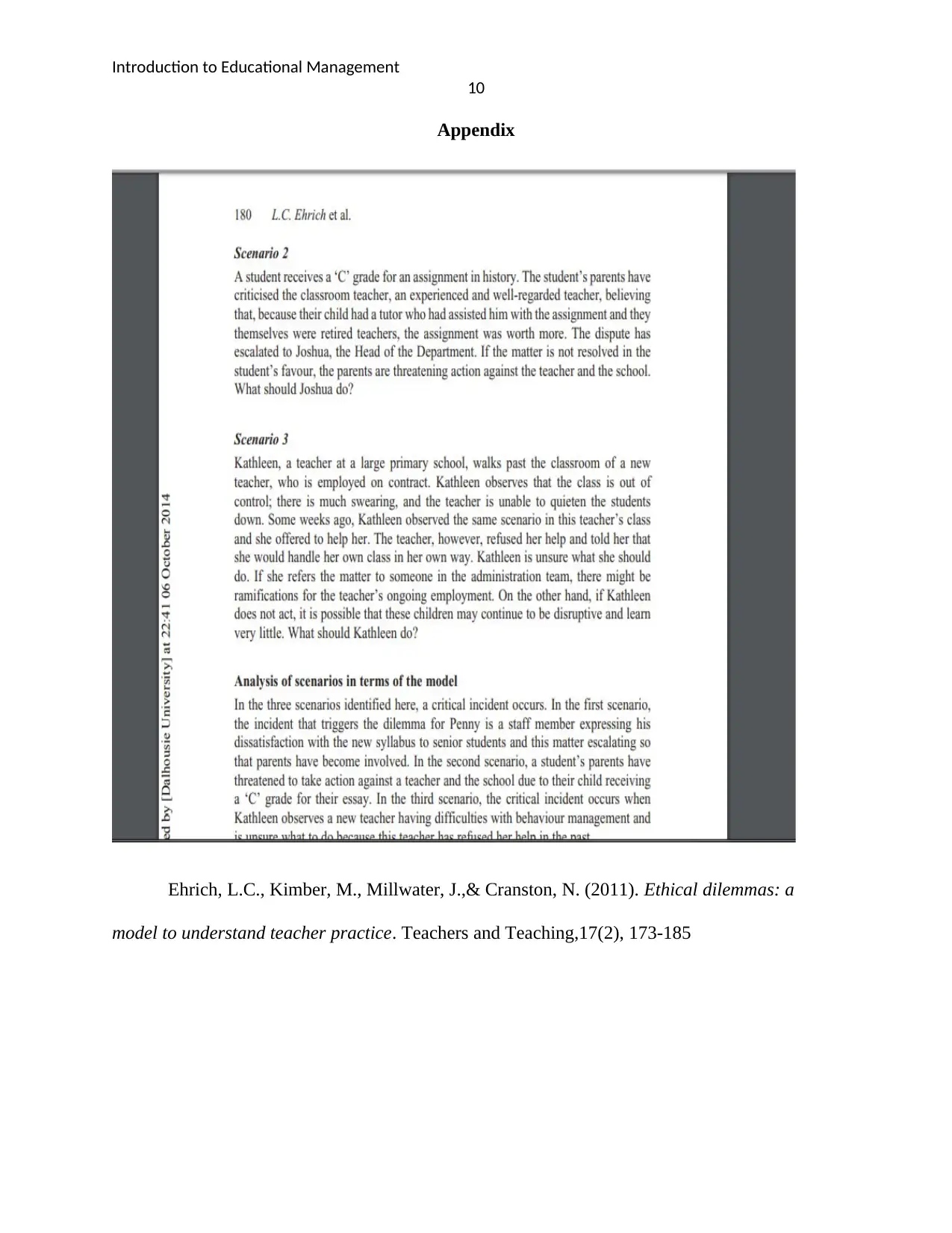
Introduction to Educational Management
10
Appendix
Ehrich, L.C., Kimber, M., Millwater, J.,& Cranston, N. (2011). Ethical dilemmas: a
model to understand teacher practice. Teachers and Teaching,17(2), 173-185
10
Appendix
Ehrich, L.C., Kimber, M., Millwater, J.,& Cranston, N. (2011). Ethical dilemmas: a
model to understand teacher practice. Teachers and Teaching,17(2), 173-185
1 out of 11
Related Documents
Your All-in-One AI-Powered Toolkit for Academic Success.
+13062052269
info@desklib.com
Available 24*7 on WhatsApp / Email
![[object Object]](/_next/static/media/star-bottom.7253800d.svg)
Unlock your academic potential
Copyright © 2020–2026 A2Z Services. All Rights Reserved. Developed and managed by ZUCOL.





